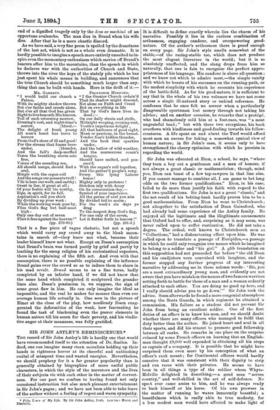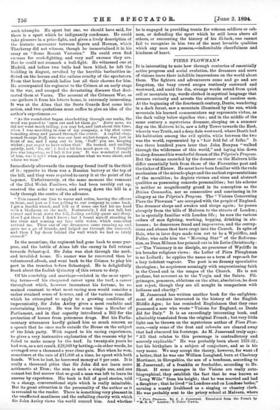SIR JOHN ASTLEY'S REMINISCENCES.*
THE record of Sir John Astley's life is hardly one that would have recommended itself to the attention of Dr. Smiles. In- deed, one can imagine many stern moralists holding up their hands in righteous horror at its cheerful and unblushing recital of misspent time and wasted energies. Nevertheless, we should prophesy for it a far greater popularity than is generally obtained by biographies of more useful public characters, in which the style of the narrators and the lives of their subjects vie with each other in the matter of correct- ness. For our part we confess to having found not only occasional instruction but also much pleasant entertainment in Sir John's pages ; and we have not been able to take leave of the author without a feeling of regret and warm sympathy.
• Fifty Lam of My Life. By Sir John Astley, Part. Lonlon: Ham and Blackatt. It is difficult to define exactly wherein lies the charm of his narrative. Possibly it lies in the curious combination of artlessness, engaging candour, and overpowering good- nature. Of the author's artlessness there is proof enough on every page. Sir John's style smells somewhat of the stable,—of the racing-stable too, which does not produce the most elegant literature in the world; but it is so absolutely unaffected, and the slang drops from him so naturally, that one is fain to recognise the perfect appro- priateness of his language. His candour is above all question ; and we know not which to admire most,—the simple vanity with which he boasts of his successes on the running-path, or the modest simplicity with which he recounts his experience of the battle-field. As for his good-nature, it is sufficient to say that in the whole of his two volumes we have not come across a single ill-natured story or unkind reference. He confesses that he once felt no sorrow when a particularly disagreeable sportsman lost money through not taking his advice; and on another occasion, he remarks that a protégé, who had shamelessly sold him at a foot-race, was "a most
ungrateful toad ; " but with these two exceptions, his book overflows with kindliness and good-feeling towards his fellow-
creatures. A life spent on and about the Turf would afford most men an excuse for taking a somewhat cynical view of human nature; in Sir John's case, it seems only to have strengthened the cheery optimism with which he persists in regarding the world.
Sir John was educated at Eton, a school, he says, "where they turn a boy out a gentleman and a man of honour, if not always a great classic or mathematician ; though, mind you, Eton can boast of a few top-sawyers in that line also. If you cannot manage to combine all, I am game to bet long odds on the two former qualifications." Eton, in his case, failed to do more than justify his faith with regard to the first two qualifications. Sir John is not a great "classic," and the net result of his betting-book hardly proves him to be a good mathematician. From Eton he went to Christchurch; not altogether to the satisfaction of Dean Gainsford, who had already had some experience of the Astley family. He enjoyed all the legitimate and the illegitimate amusements that Oxford had to offer, and, surprising as it may seem, was never called upon to suffer rustication. He did not take a degree. The ordeal, well known to Christchurch men as "Collections," had a disheartening effect upon him. He was called upon to translate a passage of Euripides,—a passage in which he could only recognise two names which he imagined to belong to a soldier and "his girL" A glib translation on this supposition had not proceeded far before "the old Dean and his coadjutors were convulsed with laughter, and the former stopped any further progress of my interesting narrative by addressing me in these solemn words : Sir, you are a most extraordinary young man, and evidently are not aware that you have mistaken the names of two famous warriors setting forth to battle for those of a man and a woman ardently attached to each other. You are doing no good up here, and I really should advise you to go down." Sir John took the advice. Soon afterwards he found a more congenial atmosphere among the Scots Guards, in which regiment he obtained a commission. His failure as a student did not prevent Sir John from being an excellent soldier. One of the first duties of an officer is to know his men, and we should doubt whether there are many officers who managed to fulfil that duty better than the author. He joined heart and soul in all their sports, and did his utmost to promote good fellowship between all ranks. He remarks in one place on the surprise evinced by some French officers on learning that an English- man thought 28,000 well expended in obtaining all his steps as captain of a company. It is possible that he might have surprised them even more by his conception of what an officer's rank meant; for Continental officers would hardly conceive that it was consistent with their dignity to strip and run races with their privates. He seems to have been in all things a type of the soldier whom Whyte- Melville delighted in describing,— a good man "across country," and well-skilled in the art of self-defence. No spott ever came amiss to him, and he was always ready to back himself or his horse. Of his own prowess in the matter of running he waxes innocently boastful; a boastfulness which is really akin to true modesty, for a leas modest man would have affected to make light of
such triumphs. No sport but one, we should have said, for there is a sport which he indignantly condemns. He could
take pleasure in a prize-fight, and gives a lively description of the historic encounter between Sayers and Heenan, which Thackeray did not witness, though he immortalised it in his
essay on "Some Recent Victories.'" He could even find excuses for cock-fighting, and very naïf excuses they are.
But be could not stomach a bull-fight. He witnessed one at Madrid, and before two bulls had been killed, he left the building in disgust, revolted by the horrible barbarities in- flicted on the horses and the callous cruelty of the spectators. From that hour Spanish ladies lost all their charms for him.
He accompanied his regiment to the Crimea at an early stage in the war, and escaped the devastating diseases that deci- mated them at Varna. The account of the Crimean War, as one gathers it from his letters home, is extremely interesting.
It was at the Alma that the Scots Guards first came into action, and two quotations must suffice to give an idea of the author's experiences :-
"As the round-shot began ricochetting through our ranks, the word was passed to open out and let them go.' Entre nous, we did not want much telling, you may bet, and just about this time, when I was marching in rear of my company, a big shot came bounding along and passed through the centre. A capital chap, named George Duff, who was our best wicket-keeper, was just in front of me, and I sang out to him, Duff ! you are keeping wicket ; you ought to have taken that.' He turned, and smiling quietly, said, No, sir ! is had a bit too much pace on. I thought you was long-stop, so I left it for you.' It was wonderful ready of him, was it not ? when you remember what we were about, and where we were."
Immediately afterwards the company found itself in the thick of it : opposite to them was a Russian battery at the top of the hill, and they were required to carry it at the point of the bayonet. Unfortunately, at the same moment the remnant of the 23rd Welsh Fusiliers, who had been terribly cut up, received the order to retire, and swung down the hill in a body through the centre of the advance.
"This caused our line to waver and retire, leaving the officers in front, and just as I was yelling to our company to come back, I got a fearful whack, and felt as if some one had hit me hard with a bludgeon on the neck. Fortunately, I did not fall, but turned and went down the hill, feeling awfully queer and dizzy. How I got there I don't know ; but I found myself standing in the river and sousing my face with water, which somewhat revived me. Then one of our drummers came running up and gave me a go of brandy, and helped me through the vineyard, and then I lay dont' behind the wall which we had so lately crossed."
In the meantime, the regiment had gone back to some pur- pose, and the battle of Alma left the enemy in full retreat towards SebastopoL Sir John was shot through the neck, and invalided home. No sooner was he recovered than he volunteered afresh, and went back to the Crimea to play his part in the trenches before Sebastopol. He is delightfully frank about the foolish Qaixotry of this return to duty.
Of his courtship and marriage—related in the most sport- ing terms—of his chequered career upon the turf, a career throughout which, however inconstant his fortune, he re- mained constant to what most racing men would consider a rather strained sense of honour, and of the various remedies which he attempted to apply to a growing condition of impecuniosity, Sir John Astley gives a most readable and entertaining history. He was for some time a Member of
Parliament, and in that capacity introduced a Bill for the protection of horses from poisonous drugs. But his Parlia- mentary utterances hardly gained him so much renown as a speech that he once made outside the House on the subject of the Irish party. With regard to his racing experiences, he gives a very instructive explanation of the reasons why be failed to make money by the turf. In twenty-six years he
had won, as a net result, £28,968 by betting,—in other words, he averaged over a thousand a year clear gain. But when he won, sometimes at the rate of £11,000 at a time, he spent with both hands. When he lost, he borrowed money at 8 per cent. It is really a thousand pities that Sir John did not learn more arithmetic at Eton ; the sum is such a simple one, and one cannot but feel sorrow that so good a man was left to learn its answer by experience. His book is full of good stories, told in a slangy, conversational style which is really inimitable. But its great attraction is the personality of the author as it is revealed to the reader. There is kmething very pleasant in the unaffected manliness and the unfailing charity with which Sir John Astley views the world around him. And whether he is engaged in providing treats for veteran soldiers or cab- men, or defending the sport which he still loves above all others, or recounting the history of his ill-luck, one cannot fail to recognise in him two of the most loveable qualities which any man can possess,—indomitable cheerfulness and kindness of heart.







































 Previous page
Previous page